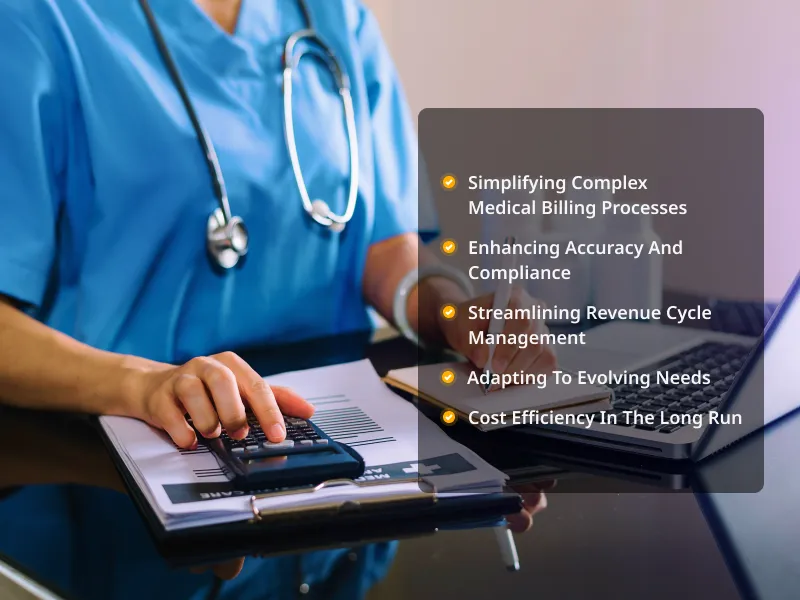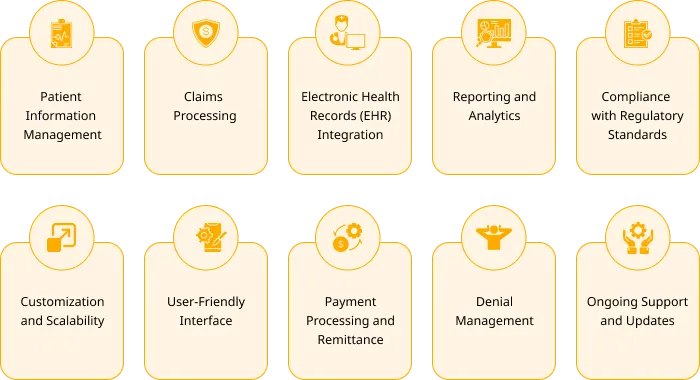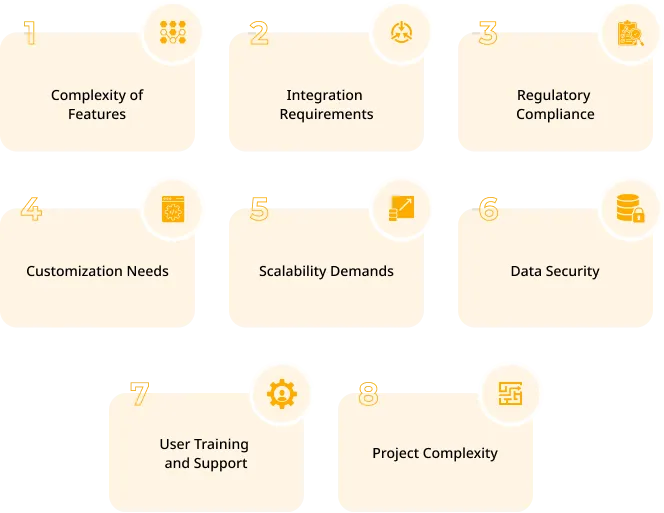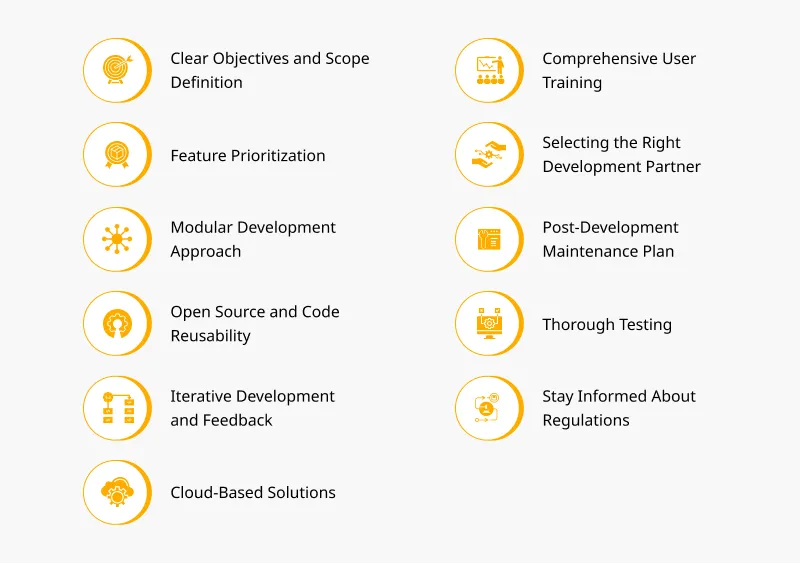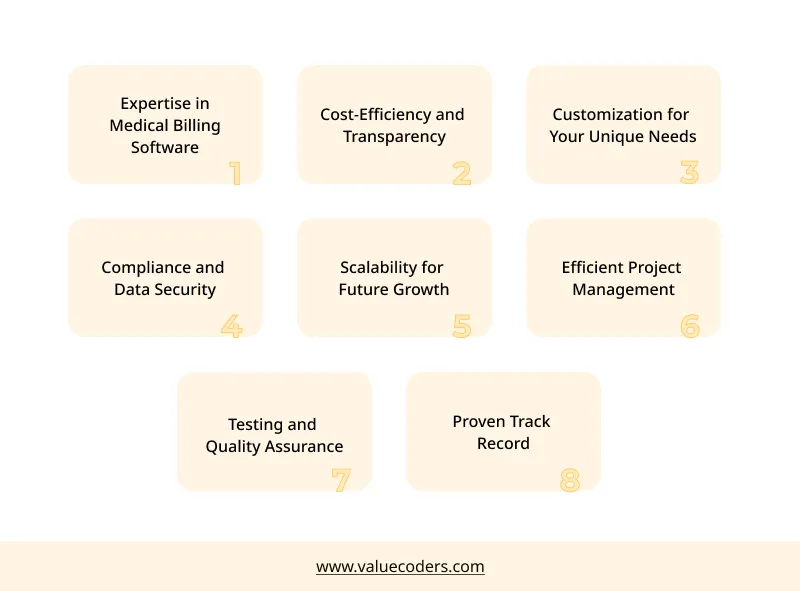Have you ever wondered why the cost of medical billing software can vary significantly?
The healthcare sector is rapidly evolving, and the need for efficient, accurate, and cost-effective medical billing solutions is more crucial than ever before.
Approximately 80% of healthcare providers have transitioned from paper-based billing to digital solutions in recent years? The number makes it evident that medical billing software has become a necessity for healthcare institutions. But software development comes with a hefty pricetag, and many startups and mid-size businesses might find it difficult to bear the cost.
This blog post will help businesses understand the factors that influence the cost of medical billing software and how to optimize it. We will also discuss more about custom medical billing software, must-have features, and key pointers to help your healthcare service business grow further.
Need for Custom Medical Billing Software
Medical billing software is the backbone of healthcare administration, streamlining the complex billing, coding, and claim management process.
In today’s healthcare landscape, where precision, efficiency, and accuracy are paramount, the role of custom medical billing software cannot be overstated.
Simplifying Complex Medical Billing Processes
Medical billing can quickly become overwhelming with its intricate coding systems and ever-evolving regulations. Off-the-shelf solutions offer some assistance, but they often fall short of addressing the specific requirements of healthcare facilities.
On the other hand, custom medical billing software simplifies these complexities. It adapts to the facility’s workflow, ensuring smoother operations.
Enhancing Accuracy and Compliance
The cost of medical billing software isn’t just about dollars and cents; it’s about accuracy and compliance. Custom solutions can be fine-tuned to adhere to stringent regulations, such as HIPAA, ensuring patient data security and compliance with billing codes. This level of customization minimizes errors, reducing the chances of claim denials and revenue loss.
Streamlining Revenue Cycle Management
Revenue cycle management is at the heart of a healthcare facility’s financial health. Custom medical billing software optimizes this cycle, from patient registration to claim submission and payment processing. It ensures that claims are processed promptly, leading to faster reimbursements and improved cash flow.
Adapting to Evolving Needs
The healthcare landscape is changing constantly. New regulations, changing billing codes, and evolving patient needs necessitate software that can adapt. Custom medical billing software can be updated and expanded as required, ensuring it remains a valuable asset for years to come.
Cost Efficiency in the Long Run
While the upfront cost of developing custom medical billing software may seem higher than off-the-shelf alternatives, the long-term cost savings are significant. Custom solutions reduce errors, expedite payments, and adapt to growth, ultimately improving financial outcomes.
Understanding the need for custom medical billing software goes beyond the initial cost considerations. It’s about ensuring accuracy, compliance, and efficiency in healthcare billing processes for software development services.
Also Read: The Future Of Healthcare Software Development: Emerging Trends For 2023
Cost of Building a Custom Medical Billing Software
As already discussed, building a custom medical billing software cost can vary widely based on the features, complexity, and technology stack involved.
According to industry experts, the overall start-up medical billing and coding software cost for hosting your own system is between $3,000 and $8,000. However, the total cost depends on enterprise size and whether you want on-site servers or not.
The cost of web-based or “cloud” software ranges from $26 to $112 per month. A percentage of claims processed through the vendor’s software is also often charged. Furthermore, it is essential to consider how many physicians use software and how many patients are seen per day.
Generally, cloud-based medical billing software will cost less than hosted software. Many software providers charge a fixed monthly fee. The typical starting cost for the service is between $30-$100 per month per user, not including set-up and other fees. Higher tier pricing plans can even go to $200-$500 per month (360 Connect).
In addition to monthly and up-front costs, additional costs will be included with medical billing software for both cloud and hosted options. It’s better to add in these costs when determining your overall budget and expenses. Here are some of the additional cost breakdowns that you can expect when getting medical billing software:
- Software training: $1,000 – $3,000
- Software license: $1,500 – $3,500 per user
- Annual maintenance and upgrades: $1,500 – $3,500 per year
- Dedicated room to house the server
- Updates and IT support
Remember to take your time with revenue management, and investing in a sustainable plan to support your practice continuously is recommended.
Must-Have Features in a Custom Medical Billing Software
The key to effectiveness lies in the details when developing a custom medical billing software solution. The success of your medical billing process hinges on having the right features at your fingertips.
Let’s explore the essential features that make custom medical billing software invaluable in managing the cost of medical billing services and enhancing the efficiency of your healthcare facility.
- Patient Information Management
Efficient medical billing starts with accurate patient data. A robust medical billing software should have comprehensive patient information management capabilities. This includes patient demographics, insurance details, and medical history. Such a feature ensures that claims are processed correctly from the outset, reducing costly errors.
- Claims Processing
Claim processing lies at the core of medical billing. Your software should facilitate the seamless creation, submission, and tracking of insurance claims. It should automate coding, optimize claim accuracy, and flag potential errors before submission. This not only saves time but also helps maximize revenue.
- Electronic Health Records (EHR) Integration
Electronic Health Records (EHR) integration is paramount in today’s digital healthcare ecosystem. A custom medical billing software should seamlessly integrate with your EHR system to access patient data, diagnoses, and treatment information. This integration streamlines the billing process, reducing duplication of efforts and enhancing accuracy.
- Reporting and Analytics
Effective decision-making relies on data. Your medical billing software should offer robust reporting and analytics features. It should generate detailed reports on claims status, reimbursement rates, and revenue trends. Access to real-time data empowers healthcare facilities to make informed financial decisions.
- Compliance with Regulatory Standards
Medical billing involves handling sensitive patient information, making compliance with regulations like HIPAA non-negotiable. Your software should have built-in safeguards to protect patient data and ensure adherence to regulatory standards. Failure to do so could result in large fines and damage your facility’s reputation.
- Customization and Scalability
Customizability is a hallmark of custom medical billing software. It should adapt to your facility’s unique needs, workflows, and specialties. Furthermore, it should be scalable, allowing for growth without needing a complete overhaul. Scalability ensures that your software remains a cost-effective solution in the long run.
- User-Friendly Interface
Ease of use is vital for efficient medical billing. A user-friendly interface reduces training time for staff and minimizes errors. Look for software that provides intuitive navigation, clear workflows, and user support.
Discover ValueCoders' custom medical billing software for optimal financial health.
- Payment Processing and Remittance
Your software should handle payment processing and remittance effortlessly. It should support various payment methods, track payments, and reconcile them with outstanding claims. This feature speeds up revenue collection.
- Denial Management
Claims denial is a common challenge in medical billing. Effective denial management features in your software help identify the reasons for denials, automate resubmissions, and reduce the overall rate of denials.
- Ongong Support and Updates
Choose a vendor that provides ongoing support and updates for telehealth software development. Medical billing regulations change frequently, and your software needs to stay current. Support ensures that you can address issues promptly, minimizing disruptions in your billing process.
Incorporating these must-have features into your custom medical billing software not only ensures efficient billing processes but also contributes to managing the cost of medical billing software over time. The right features can reduce errors, faster reimbursements, and improve financial outcomes for your healthcare facility.
Also Read: Top 8 Healthcare Software Development Companies To Outsource Your Project
Factors Influencing Development Costs of Medical Billing Software
The cost of developing custom medical billing software is influenced by various factors, each of which plays a pivotal role in determining the final expenses. Let’s delve deeper into these key influencers:
Complexity of Features: The intricacy of the software’s features significantly impacts costs. Advanced functionalities like real-time eligibility verification, patient engagement IT solutions, and detailed reporting require extensive coding, thorough testing, and more development hours. These complexities can drive up expenses.
Integration Requirements: Integration with existing systems, like Electronic Medical Records (EMR) or practice management software, can be a double-edged sword. While seamless data exchange is vital, it often necessitates careful planning, custom coding, and additional development efforts, which can add to the cost.
Regulatory Compliance: Ensuring the medical billing software complies with healthcare regulations, especially HIPAA, is non-negotiable. Achieving and maintaining compliance demands expertise, meticulous documentation, and rigorous testing, all contributing to the development cost.
Customization Needs: The extent of customization required to align the software with specific workflows and unique requirements can be a significant cost driver. Tailoring the software to fit precisely within an organization’s operational framework adds complexity and development hours.
Scalability Demands: While developing a scalable solution is an upfront investment, it can save cost over time. Scalability allows the software to adapt to growing demands without requiring extensive redevelopment. However, building this scalability into the initial design may increase the cost.
Data Security: Ensuring robust data security measures, such as encryption, access controls, and compliance with security standards, is paramount in healthcare software development services. While vital for protecting patient information, these measures contribute to development expenses.
User Training and Support: Budgeting for user training and ongoing support is essential. Ensuring staff can effectively use the software requires investments in training materials, sessions, and support resources, which should be considered part of the overall cost.
Project Complexity: The complexity of the project itself can impact costs. Factors such as the number of stakeholders involved, the geographic locations of the organization, and the level of coordination required can all influence the development timeline and associated costs.
By comprehensively understanding these factors, healthcare organizations can make informed decisions about their custom medical billing software projects. While some elements may increase upfront expenses, they often translate into long-term cost savings by enhancing efficiency, ensuring compliance, and optimizing revenue management.
Get free consultation and let us know your project idea to turn it into an amazing digital product.
How to Optimize the Cost of Medical Billing Software Development
Creating custom medical billing software that aligns with your organization’s needs while managing costs effectively requires a thoughtful approach. Here are key strategies to optimize the development cost while ensuring quality and functionality:
Clear Objectives and Scope Definition: Start by establishing clear project objectives and defining the scope. Understand what you aim to achieve with the medical billing software. This clarity prevents project scope creep, which can inflate costs as you add additional features.
Feature Prioritization: Prioritize features based on their importance to your billing process. Identify core functionalities that directly impact efficiency and compliance. Consider postponing non-essential elements to later development phases to reduce upfront costs.
Modular Development Approach: Adopt a modular development approach. Build essential core functionalities and expand the system with additional modules or features over time. This phased approach spreads costs and allows you to adapt the software gradually.
Open Source and Code Reusability: Leverage open-source components and encourage code reusability. Utilizing existing open-source solutions for certain functionalities can significantly cut development costs. Additionally, it promotes the creation of reusable code components to save time and effort.
Iterative Development and Feedback: Embrace an iterative development process involving regular feedback and stakeholder reviews. This ongoing dialogue helps identify and address issues early, preventing costly fixes during later stages.
Cloud-Based Solutions: Consider cloud-based solutions for hosting and data storage. Cloud services offer cost-effective scalability and eliminate the need for extensive infrastructure investments. This approach can reduce operational costs in the long term.
Comprehensive User Training: Invest in comprehensive user training and support from the outset. Well-trained staff can use the software more efficiently, reducing costly errors and minimizing the need for extensive support.
Selecting the Right Development Partner: Choose an experienced development partner like ValueCoders, well-versed in medical billing software. Their expertise can streamline development, helping you avoid common pitfalls and optimize costs.
Post-Development Maintenance Plan: Plan for post-development maintenance and updates. Regular maintenance ensures that your software remains efficient, secure, and compliant. Preventing major issues through routine maintenance saves time and money.
Thorough Testing: Rigorous testing during development is critical. Identifying and rectifying issues early in the development process reduces the risk of costly bug fixes and security breaches after deployment.
Stay Informed About Regulations: Stay up-to-date with evolving healthcare regulations. Compliance failures can lead to expensive penalties and legal consequences. Staying informed is essential for long-term cost control.
By implementing these strategies, you can effectively manage the cost of developing medical billing software while ensuring it meets your organization’s specific requirements. It’s about making informed choices, setting clear priorities, and collaborating with the right partners to create a cost-efficient solution that delivers lasting value.
Get free consultation and let us know your project idea to turn it into an amazing digital product.
Why Choose ValueCoders to Build Custom Medical Billing Software?
Selecting the right partner to develop your custom medical billing and the future of healthcare software development is critical. When creating a solution that seamlessly combines efficiency, compliance, and cost-effectiveness, ValueCoders stands out as the preferred choice. Here’s why you should entrust us with your medical billing software project:
Expertise in Medical Billing Software:
At ValueCoders, we bring extensive expertise in developing custom medical billing software. Our team understands the intricacies of medical billing processes, compliance requirements, and the evolving landscape of healthcare. We’ve successfully delivered tailored solutions to healthcare organizations, ensuring efficient billing operations.
Cost-Efficiency and Transparency:
We recognize the importance of managing the cost of medical billing software development. Our approach emphasizes cost-efficiency without compromising on quality. We provide transparent pricing structures, ensuring you clearly understand the investment required throughout the project.
Customization for Your Unique Needs:
Every healthcare facility has unique requirements. ValueCoders specializes in tailoring solutions to match your specific workflows and operational demands. Our customizations ensure that the medical billing software aligns perfectly with your organization’s processes, enhancing efficiency and accuracy.
Compliance and Data Security:
Compliance with healthcare regulations, including HIPAA, is paramount in medical billing software. ValueCoders prioritizes data security and regulatory adherence throughout the development process. Your patients’ data will be handled with the highest level of care and protection.
Scalability for Future Growth:
We understand that healthcare organizations evolve over time. Our custom medical billing software solutions are designed with scalability in mind. As your facility grows or your needs change, our software can adapt, reducing the need for costly redevelopments.
Efficient Project Management:
Effective project management is a cornerstone of our approach. We ensure your project progresses smoothly, stays on schedule, and aligns with your budget. Our experienced project managers oversee every aspect, preventing delays and cost overruns.
Testing and Quality Assurance:
ValueCoders maintains rigorous testing and quality assurance practices. We thoroughly evaluate the software to identify and resolve issues early, reducing post-deployment costs and ensuring a reliable, bug-free system.
Proven Track Record:
Our track record speaks for itself. We’ve successfully delivered similar billing software to organizations worldwide. Our clients trust us to provide innovative, cost-effective solutions that streamline their billing processes. Here are some of our previous works for your reference:
In conclusion, when you choose ValueCoders to build your custom medical billing software, you choose a partner with the expertise, commitment to cost-efficiency, and a proven record of delivering tailored solutions.
Our focus on customization, compliance, and scalability ensures that your software meets your current needs and positions your organization for future success in the dynamic healthcare landscape.
Entrust your project to us, and let us help you optimize the cost of your medical billing software while ensuring top-notch quality and functionality.


